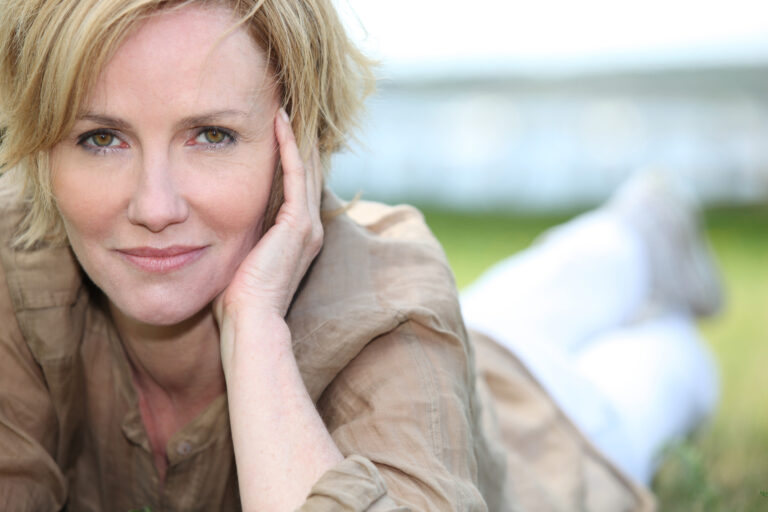Part I Menopause: Restoring Retired Ovary Function
When your ovaries “retire”, either naturally or surgically, we call it menopause. There is an assumption that when this occurs, that estrogen just stops. Although the levels of estrogen and progesterone hormones diminish during this time of life, no longer needed in large quantities to support reproduction, they don’t stop. Since all hormones, with few exceptions are vitally needed throughout life, the body has a back-up system to continue to produce hormones for the duration of life. So if you are suffering from “hormone deficiency symptoms” such as hot flashes, night sweats, mood swings, low libido, etc., you should be asking why.
For the remainder of life the adrenals, fat cells, breasts and the liver play the primary role in hormone production. They do not produce pre-menopausal levels – they’re not supposed to. “Just because a hormone declines, doesn’t necessarily mean we should automatically replace it,” says Jeffrey Bland, Ph.D. “The goal should be balance. We don’t want to override the body’s ability to normalize itself.” “Administering hormones [as replacement therapy] is playing with fire. “We have to understand that there is an intricate feedback system in the body for hormones and disrupting that delicate balance can be harmful, rather than helpful.
When confronted with the discomfort of menopausal symptoms, a woman frequently grabs for anything she can get her hands on for allaying the symptoms. Most will turn to their medical doctors for hormones. For about 50 years the use of hormone replacement therapy (HRT) was relatively unopposed. But in 2002 after an announcement by the Women’s Health Initiative of the National Institutes of Health that those receiving conjugated equine hormones had increased risk of breast cancer, heart attacks and strokes, the attitude towards HRT changed. This study was reconfirmed in a larger national study called The Million Women Study done in the UK.
At that time other alternatives were sought out. During this time the relatively unrecognized field of Bio-Identical Hormone Replacement Therapy (BHRT) blossomed. Women began pleading with their doctors to prescribe BHRT instead, not understanding that these too are drugs. They affect the natural biochemical feedback system involving many other organs and hormones. When a bio-identical hormone (or any exogenous hormone – an outside hormone given instead of the body producing it) is introduced, all the other associated glands have to adjust their function to compensate, potentially causing some disrupting effects.
While ovaries necessarily shrink after menopause, other systems are not supposed to. When you give an exogenous hormone the body says “Hey! Where’d all this extra hormone come from? I don’t know, but I’ll take it!” And it stops producing its own, getting lazier and lazier, making the person dependent upon it. As the gland scales back in its own production, HRT dosages must be increased to make up the difference.
Better to support the glands, organs and tissues responsible for hormone production so they can supply the hormones themselves, rather than sending in replacements. How we do that will be in Part II of Menopause: Restoring Retired Ovary Function.
Part II Menopause: Restoring Retired Ovary Function
In Part I of Menopause: Restoring Retired Ovary Function we cited that while the ovaries retire, the body still has a supply source – the adrenals, liver, breasts and fat cells. Before discussing the preferred option of supporting function, rather than replacing hormones, let’s look at why Hormone Replacement Therapy isn’t always the best remedy.
First of all, Hormone Replacement Therapy (HRT) is a drug approach, whether they are synthetic medications or Bio-Identical Hormones (BHRT). HRT and BHRT is hormone treatment not therapy. It is symptom-chasing, not healing. It is supplementing diminished hormones artificially, not encouraging the body to make its own. According to Kathleen Uhl, MD, the FDA’s assistant commissioner for women’s health, “The evidence that FDA has seen and what’s available in the medical literature leads us to believe that there are the same concerns with bioidentical and other hormone therapy for menopausal symptoms.” This is because they are all drugs (even the over-the-counter creams can be classified as such) and not a remedy.
This statement will probably upset many, so let me clarify. For many centuries we have done without drug hormones. The symptoms we experience today were extremely rare in the past. That was because our diets were more in line with what was needed for good health and our stresses were much different. Stress and diet play a key role in healthy hormones, and because both are in excess and largely unhealthy, it stands to reason our hormonal symptoms will be as well. While there could be some value to short term BHRT, in the long run, function needs to be restored, not replaced.
In her book What Doctors Don’t Tell You, Dr Ellen Grant says “There is no single magic cure (or rub-on-cream) for the man-defined ‘disease’ of the menopause”. “The best way to approach menopause”, she says, “is to observe simple rules that promote good health such as a good diet, food supplements, avoiding tobacco and other toxins, and getting plenty of fresh air, sunshine, and exercise.”
I agree whole-heartedly. There is so much that we can do to support the function of our endocrine (hormone-producing) system. Particular attention needs to be paid to the adrenal glands, the thyroid, the liver, the sugar-handling mechanism, and our fat reserves. Women approaching menopause frequently gain weight as fat is storage for hormones. However, excess weight also traps toxins, particularly estrogen-mimicking toxins that can have a negative effect on hormonal balance.
Every organ and gland in the endocrine system is dependent upon minerals for function. For example, the thyroid needs iodine, the pancreas needs chromium, and the ovaries need manganese. Supplying our diet with mineral-dense foods such as green leafy vegetables is a great start in supporting these glands which are frequently starving. We need Essential Fatty Acids (EFA’s) in great quantities. These are needed for the body to make hormones. Avocados, fish and fish oil supplements are generally quite helpful.
Acupuncture is also helpful in balancing hormones. Since the goal of acupuncture is to stimulate function and to “harmonize” organ function, it is a great restorative treatment modality.
If you want to feel what anthropologist Margaret Mead describes as “postmenopausal zest”, a feeling of renewed energy and vitality, choose to correct the underlying reason for hormonal symptoms rather than just masking them.
©2010 Holly A. Carling, O.M.D., L.Ac., Ph.D.







